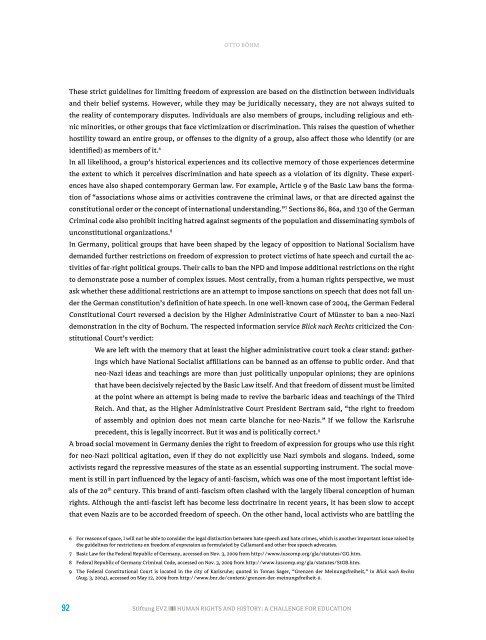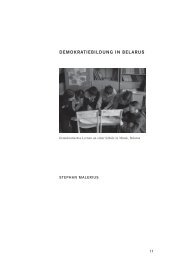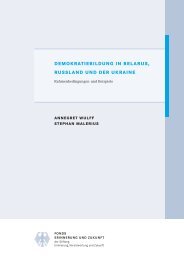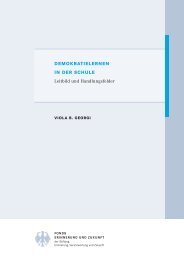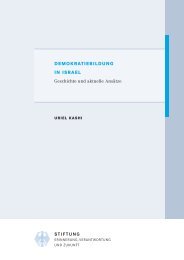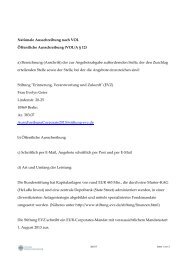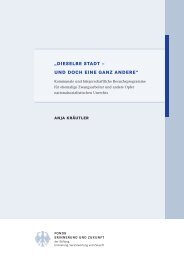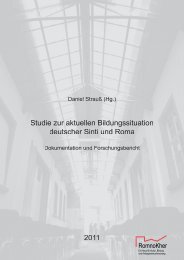chapter 2 - Stiftung "Erinnerung, Verantwortung und Zukunft"
chapter 2 - Stiftung "Erinnerung, Verantwortung und Zukunft"
chapter 2 - Stiftung "Erinnerung, Verantwortung und Zukunft"
Create successful ePaper yourself
Turn your PDF publications into a flip-book with our unique Google optimized e-Paper software.
Otto Böhm<br />
These strict guidelines for limiting freedom of expression are based on the distinction between individuals<br />
and their belief systems. However, while they may be juridically necessary, they are not always suited to<br />
the reality of contemporary disputes. Individuals are also members of groups, including religious and ethnic<br />
minorities, or other groups that face victimization or discrimination. This raises the question of whether<br />
hostility toward an entire group, or offenses to the dignity of a group, also affect those who identify (or are<br />
identified) as members of it. 6<br />
In all likelihood, a group’s historical experiences and its collective memory of those experiences determine<br />
the extent to which it perceives discrimination and hate speech as a violation of its dignity. These experiences<br />
have also shaped contemporary German law. For example, Article 9 of the Basic Law bans the formation<br />
of “associations whose aims or activities contravene the criminal laws, or that are directed against the<br />
constitutional order or the concept of international <strong>und</strong>erstanding.” 7 Sections 86, 86a, and 130 of the German<br />
Criminal code also prohibit inciting hatred against segments of the population and disseminating symbols of<br />
unconstitutional organizations. 8<br />
In Germany, political groups that have been shaped by the legacy of opposition to National Socialism have<br />
demanded further restrictions on freedom of expression to protect victims of hate speech and curtail the activities<br />
of far-right political groups. Their calls to ban the NPD and impose additional restrictions on the right<br />
to demonstrate pose a number of complex issues. Most centrally, from a human rights perspective, we must<br />
ask whether these additional restrictions are an attempt to impose sanctions on speech that does not fall <strong>und</strong>er<br />
the German constitution’s definition of hate speech. In one well-known case of 2004, the German Federal<br />
Constitutional Court reversed a decision by the Higher Administrative Court of Münster to ban a neo-Nazi<br />
demonstration in the city of Bochum. The respected information service Blick nach Rechts criticized the Constitutional<br />
Court’s verdict:<br />
We are left with the memory that at least the higher administrative court took a clear stand: gatherings<br />
which have National Socialist affiliations can be banned as an offense to public order. And that<br />
neo-Nazi ideas and teachings are more than just politically unpopular opinions; they are opinions<br />
that have been decisively rejected by the Basic Law itself. And that freedom of dissent must be limited<br />
at the point where an attempt is being made to revive the barbaric ideas and teachings of the Third<br />
Reich. And that, as the Higher Administrative Court President Bertram said, “the right to freedom<br />
of assembly and opinion does not mean carte blanche for neo-Nazis.” If we follow the Karlsruhe<br />
precedent, this is legally incorrect. But it was and is politically correct. 9<br />
A broad social movement in Germany denies the right to freedom of expression for groups who use this right<br />
for neo-Nazi political agitation, even if they do not explicitly use Nazi symbols and slogans. Indeed, some<br />
activists regard the repressive measures of the state as an essential supporting instrument. The social movement<br />
is still in part influenced by the legacy of anti-fascism, which was one of the most important leftist ideals<br />
of the 20 th century. This brand of anti-fascism often clashed with the largely liberal conception of human<br />
rights. Although the anti-fascist left has become less doctrinaire in recent years, it has been slow to accept<br />
that even Nazis are to be accorded freedom of speech. On the other hand, local activists who are battling the<br />
6 For reasons of space, I will not be able to consider the legal distinction between hate speech and hate crimes, which is another important issue raised by<br />
the guidelines for restrictions on freedom of expression as formulated by Callamard and other free speech advocates.<br />
7 Basic Law for the Federal Republic of Germany, accessed on Nov. 3, 2009 from http://www.iuscomp.org/gla/statutes/GG.htm.<br />
8 Federal Republic of Germany Criminal Code, accessed on Nov. 3, 2009 from http://www.iuscomp.org/gla/statutes/StGB.htm.<br />
9 The Federal Constitutional Court is located in the city of Karlsruhe; quoted in Tomas Sager, “Grenzen der Meinungsfreiheit,” in Blick nach Rechts<br />
(Aug. 3, 2004), accessed on May 12, 2009 from http://www.bnr.de/content/grenzen-der-meinungsfreiheit-0.<br />
92<br />
<strong>Stiftung</strong> EVZ<br />
HUMAN RIGHTS AND HISTORY: A CHALLENGE FOR EDUCATION


